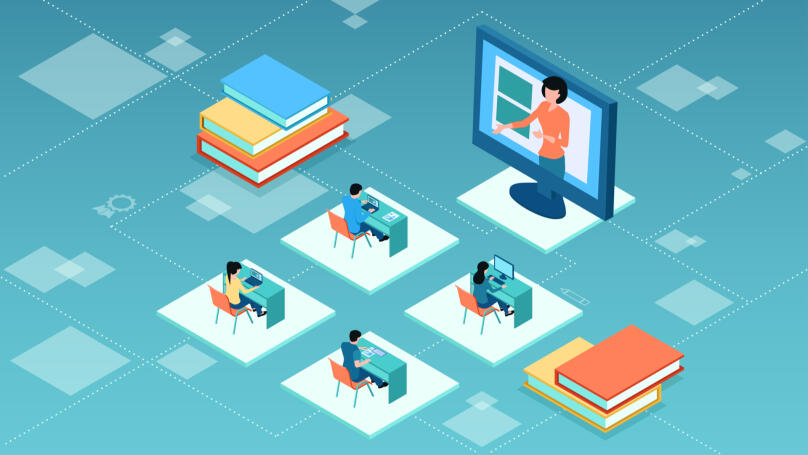The online education trends that cannot be ignored in autumn 2021
The coronavirus has triggered a huge surge of interest in online education.

However, it also seems that distance learning will still be in demand for a long time to come. This is because new coronavirus strains are already emerging, and existing vaccines may not be effective. The spread of a new aggressive strain means that schoolgoers and university students will yet again have to switch to remote learning en masse. This got me thinking, what will online education look like in the autumn of 2021? Will it be any different compared with last year?
It is worth mentioning that the trends in online education we are seeing now especially clearly have existed before. Although the pandemic has stimulated them greatly, it has not brought about anything new in this area. Thus, all the trends that I will discuss today have been in existence before the pandemic simply accelerated them and made them more noticeable. So, here's what, in my opinion, we should expect from online education very soon!
The growth of the online education market

The demand for online education is mainly driven by the pandemic and the social and economic crisis it has caused. Many people today are losing their jobs, so they urgently need to master a new profession. Others may have had problems finding a new job during the rise of coronavirus and likewise during economic recovery after the pandemic. In this case, courses that enable them to quickly improve their qualifications or change competencies will be their lifeline.
After all, people nowadays have many more opportunities to change their field of work than individuals from the past. The very structure of employment is now changing. In a 2020 study, Gartner found that a third of organisations have abandoned permanent workers favouring the self-employed. A full-time job with a fixed salary does not necessarily guarantee secure career growth or even stable employment. Currently, it's only those who are constantly improving their professional skills that can count on this. And most regularly, people can combine work with distance learning. Otherwise, when would you manage to have the time to work as well as have a life? I created the Lectera platform to find a solution to the incompatibility of a modern lifestyle with learning. So, I can confidently say that online courses represent the best way to stay in demand and be relevant today.
Improving the quality of online education

Ten years ago, it was very difficult to verify the results from a new approach to learning or a new teaching method. It's much easier to gather feedback now, for we have the Internet, online questionnaires, and, of course, social media. Teachers may try using different tools and quickly understand how they affect the educational process. At the same time, students now have access to the same tools, and they will be able to compare them with each other, share their experiences, or "snoop" on practices at other universities. This is how students and teachers can work together. Collectively, they will choose only the best and most effective methods.
However, because of this, the competition in the online education market is growing rapidly. Online learning platforms and course creators are going out of their way to gain the highest content ratings. Is this a good thing? Of course, it is, yes! Although, it's difficult for the majority of small platforms. The enormous diversity of the market is an incentive for innovators to come up with something new and then move forward. It means that the market is set to grow even faster and include better quality!
Lectera’s Online Courses by topic
The digital transformation of higher education

The world's most prestigious universities are offering a growing number of online learning programmes. It's a natural process: online learning enables the professor to transfer their knowledge to a far greater number of students than offline (there are no classroom size limits!). Thanks to this, you can now study online today at Oxford, Cambridge, Imperial College London, and other eminent educational institutions.
Commercial platforms were the first to utilise digital technology for distance learning. Now public schools and universities use it too. Digitalisation completely changes the organisation of the educational process, making it more open and democratic. This is exactly what the next trends try to follow.
Hybrid learning

2020 has demonstrated how effective online education can be and how useful and indispensable classroom activities are for certain subjects or majors. Even the most advanced platforms cannot yet substitute face to face communication with classmates. This represents a challenge facing online education today, and I see hybrid learning as the solution.
An educational system develops when it offers students new learning formats and innovative ways to unleash their full potential. Hybrid learning, also known as "blended learning", uses both online and offline methods to combine the advantages of these two approaches and counteract their disadvantages. This is how an entirely new educational concept is born, which, perhaps, will eventually transform traditional education around the world.
Interaction and gamification

Traditional school teachers continue to believe that online education is not effective enough to compete with conventional education. Therefore, the only way for online learning to gain credibility is to make sure that together with its help, schoolchildren and students can achieve even better results when compared to taking part in offline classes. This is how interactive technologies came into being. The student doesn't just sit and listens but instantly puts their knowledge into practice and understands the material far better. Interaction is a real handicap for online learning!
Of course, a teacher may make the lesson more interactive by discussing the topics covered with their students, engaging them in conversation. However, can you compare it to a video game where you must use your new subject knowledge to win? In this respect, traditional education is losing out to online education because, as scientists have proven, interaction and gamification increase attentiveness and interest in learning a subject tenfold. In my opinion, this is exactly what modern schoolchildren (and adults too!) frequently lack.
2021 could be a year of explosive growth in online education: an entirely new tightening of quarantine restrictions remains possible, but educational institutions and commercial companies now have the experience for the swift implementation of distance learning. All the trends that I have described in this article will set the direction for the expansion of online education for a long time to come. Additionally, however, you should never rule out the possibility of a sudden emergence of new technologies, which will once again turn our ideas of education completely on its head. After all, the twenty-first century is extremely unpredictable, and nothing can surprise me at this point!
Share this with your friends via:
Latest News

A significant stage in the development of the alternative education system has begun in West Northamptonshire in the UK: the County Council is actively calling on parents, guardians, and trustees to participate in shaping the future of this key area.

Outwoods Primary School in Atherstone, Warwickshire, having experienced deep sadness after the loss of their famous cat, Silla, has found solace in a new pet – a Maine Coon named Aloysius O’Hara.

In modern universities, artificial intelligence, and in particular ChatGPT, is rapidly transforming from a controversial tool into a full-fledged student assistant.

An innovative educational project is gaining momentum in UK primary schools, aiming to change attitudes towards video games.

The Massachusetts Institute of Technology (MIT) presents MIT Learn – a revolutionary online platform that opens a “new front door” to access university knowledge and resources.












 “I’m Here for the Long Haul”: When Loyalty to a Company Becomes Toxic
“I’m Here for the Long Haul”: When Loyalty to a Company Becomes Toxic
 Freelancing, Remote Work, Office Jobs, or Consulting: How to Choose the Work Format That’s Right for You
Freelancing, Remote Work, Office Jobs, or Consulting: How to Choose the Work Format That’s Right for You
 Test: How Prone Are You to Abusive Behavior as a Manager?
Test: How Prone Are You to Abusive Behavior as a Manager?
 Test. What superpower would you possess if you were a superhero?
Test. What superpower would you possess if you were a superhero?
 Test. What Should You Let Go of Before Winter Ends?
Test. What Should You Let Go of Before Winter Ends?
 Test. Which Ritual Should You Start Practicing This Winter?
Test. Which Ritual Should You Start Practicing This Winter?
